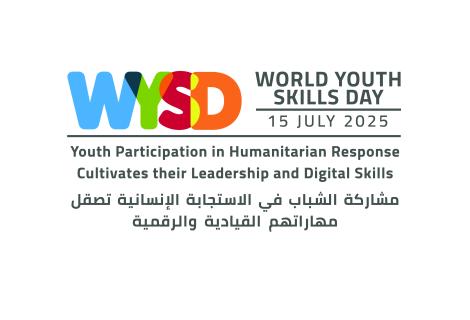ActionAid: Youth Participation in Humanitarian Response Cultivates their Leadership and Digital Skills

Occupied Palestinian Territory – As World Youth Skills Day is marked on 15 July each year, underlining the importance of developing young people’s skills to serve their communities and improve their circumstances, Palestinian youth continue to develop and build their leadership, life, digital, and professional skills. These skills help them lead humanitarian responses, strengthen community resilience, advocate for their causes, and create job opportunities despite war, displacement, bombardment, destruction, loss, siege, and restrictions on movement. This day emphasizes the need to enhance and develop youth skills, prepare them for the future, and enable them to contribute to meeting their communities’ needs in times of crisis. It is essential to invest genuinely in young people’s potential and to provide a safe environment that nurtures their skills and respects their dignity so that they can be active partners in building a free and just future.
The conditions of war, displacement, starvation, siege, settlement policies, arrests, raids on towns and camps, and movement restrictions greatly affect Palestinian youth in Gaza and the West Bank—through killing, injury, detention, loss of education and livelihoods, hunger, and deteriorating mental health. Yet these harsh circumstances have also motivated many young people to lead and design community and humanitarian initiatives to meet their society’s growing humanitarian needs caused by the ongoing war, helping their communities survive and creating work opportunities by acquiring and developing leadership, life, and digital skills to adapt to emergencies and wartime conditions.
Many humanitarian and community initiatives have cultivated the skills and character of Palestinian youth who lead these efforts among the rubble and under skies filled with the roar of airstrikes. They have gained life skills such as psychological resilience and adaptability, helping them learn, innovate, and adapt despite ongoing war—skills acquired through working in the field in shelters with the displaced, in refugee camps, and among the wounded. Through these initiatives, young people are investing in themselves and gaining skills that not only give them hope for a better future but also strengthen the resilience of their communities. They are acquiring these rare skills from the harsh realities they face.
Youth have also demonstrated exceptional management and leadership skills through their involvement in leading humanitarian work and community initiatives—turning hardship into opportunity by taking the initiative in crisis management, making decisions under pressure, dealing with unexpected challenges, and finding quick solutions with limited resources.
Palestinian youth also employ digital skills and platforms as a form of innovation and creativity for learning, working, communicating, and advocacy. These skills help them learn and freelance remotely despite the destruction of schools, universities, and infrastructure. They have also used their platforms and digital tools to advocate for their national cause and convey their messages to the outside world amid the ban on international journalists entering Gaza, to document human rights violations, and to raise community awareness about many social issues that emerge in emergencies.
ActionAid Palestine works in this context to enhance and support youth capacity-building for disaster and emergency preparedness and response by equipping them with the necessary skills and knowledge. ActionAid Palestine has established and supported the Youth Humanitarian Working Group – Palestine, which includes young activists from the West Bank and Gaza who play a role in implementing many humanitarian initiatives and activities, and in organizing advocacy campaigns calling for an end to the war and for justice for the Palestinian people in accordance with international law.
Walaa, from Gaza—a volunteer and member of the Humanitarian Youth Group Palestine who leads several humanitarian initiatives in the Gaza Strip—says: "Engaging in voluntary and humanitarian work despite the bombing, destruction, displacement, and starvation during the war has helped me develop initiative, network with institutions and youth groups, and gain effective communication skills with people, institutions, youth, and various groups.”
Ahmad Al-Kilani, a young activist in the Working Group who leads several initiatives in the West Bank, says:“I have gained many essential skills for leading humanitarian responses in emergencies, including communication and working with people, designing and building plans to deliver aid in emergencies, skills in assessing community needs during crises and measuring the impact of aid, building integrated teams, and networking and building relationships with many local and international institutions—relationships that are necessary to benefit the community. Being involved in community work during emergencies increases our sense of responsibility and commitment to humanitarian principles that preserve people’s dignity.”
About ActionAid International
ActionAid International is a global federation working with over 41 million people across more than 72 of the world’s poorest countries. We strive for a just and sustainable world where every individual enjoys the right to a dignified life and freedom, a world free from poverty and oppression. We work towards social justice, gender equality, and poverty eradication.
ActionAid Palestine began operations in 2007 to strengthen the resilience of the Palestinian people, believing in their right to freedom, justice, and self-determination. ActionAid Palestine implements several programs engaging Palestinian communities, youth groups, and women, aiming to empower women and youth and enhance their active civic and political participation to understand their rights and engage collectively in addressing rights violations resulting from prolonged occupation. It also seeks to improve their leadership capacities and citizenship practice by holding authorities and other responsible parties accountable.
For more information, please contact:
Riham Jafari
Communications and Advocacy Officer, ActionAid Palestine
Email: Riham.Jafari@actionaid.org